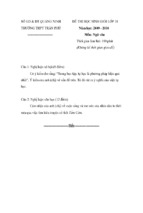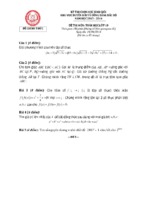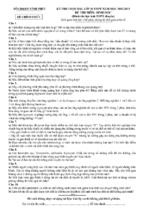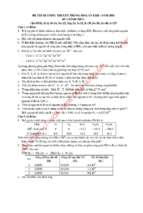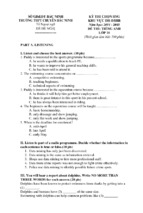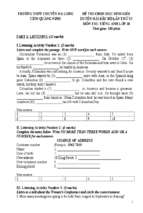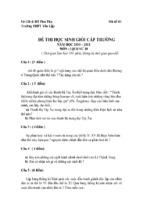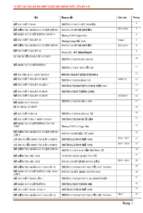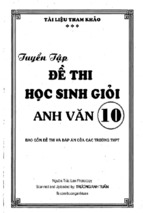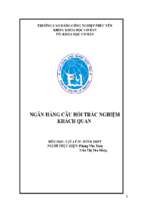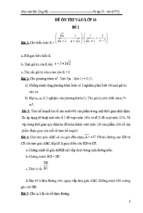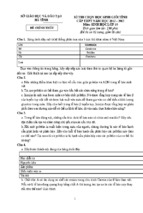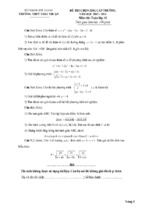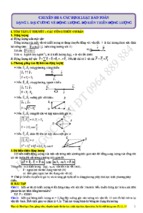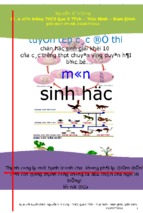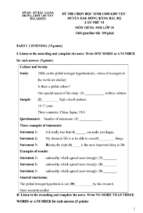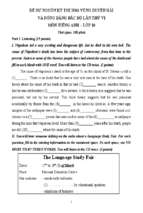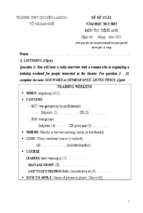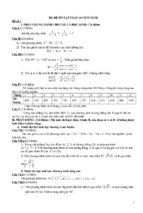TRƯỜNG THPT CHUYÊN LÀO CAI
ĐỀ ĐỀ XUẤT
TỔ: NGOẠI NGỮ
NĂM HỌC 2012-2013
MÔN THI: TIẾNG ANH
Ngày thi:
tháng
năm 2013
(Thời gian làm bài 180 phút không kể thời gian giao đề)
Đề thi gồm 18 trang
Name:………………………………………………………………………………...
A. LISTENING (15pts)
Question 1: You will hear a radio interview with a woman who is organizing a
training weekend for people interested in the theatre. For question 1 - 10,
complete the note. ONE WORD or NUMBER ONLY. LISTEN TWICE. (5pts)
TRAINING WEEKEND
WHEN: beginning of (1)……………..
CONTENT:
- SAT: two groups run by professionals
- Subjects: (2)……………….. OR (3)……………..
- SUN: two groups
- Subjects: (4)………….OR press and (5)……………..
WHERE: Mostly in the two meeting rooms (at the theatre)
COST: Whole weekend course (it booked):
(6) ………………….. (includes lunches)
COURSE
LEADERS: have training as (7) ……………….
MAIN AGE GROUP: (8)………………………..
LAST YEAR’S TRAINING DAY: concentrated on (9)…………….
HOW TO APPLY: Name of person to phone: Claire (10)…………….
1
Question 2: You will hear a conversation between a man and a woman and
complete the note below. NO MORE THAN THREE WORDS. LISTEN ONCE
ONLY. (5pts)
CHILDREN’S ART AND CRAFT WORKSHOPS
Workshops organized every: Saturday
Adults must accompany children under: (1)……….
Cost: £ 2.50
Workshops held in: Winter house, (2)………………..street
Security device: must push the (3)……………………….to open the door
Should leave car behind the (4)………………….
Book workshops by phoning the (5)………………………..(on 200765)
Question 3: You will hear an interview in which Tina White, a magazine editor,
talks about her life and work. For questions 1-5, choose the best answer A, B, C
or D. LISTEN TWICE. (5pts)
1. In her first column, Tina chose to write about people who
A. were very well-known
B. had interesting ideas
C. lived in luxury
D. inspired her
2. She took up journalism because of
A. her family connection
B. her father’s support
C. her dream
D. her love for books
3. She believes people are more likely to read an article if
A. it has good beginning
2
B. its content is challenging
C. it is mentioned in the cover
D. its title is impressive
4. When she started her present job five years ago, she
A. organized her ideal team
B. had more time to read everything
C. lacked confidence in her staff
D. was interested in her job
5. In the future, she would like to
A. be a book editor
B. produce a film
C. continue doing the same job
D. write fiction
Your answers:
1.
2.
3.
4.
5.
B. LEXICO-GRAMMAR
I.
Choose the option that best fits the blank of each sentence. (10pts)
1. I could probably ………….. out the answer if I had a pencil, some paper and a
calculator.
A. think
B. study
C. hand
D. work
2. When facing problems, it is important to keep a sense of …………………
A. proportion
B. introspection
C. relativity
D. comparison
3. I ………….in to see Chris on my way home.
A. joined
B. dropped
C. plugged
D. put
4. I love to do things for children because I get a ……………out of it.
A. pass
B. shoot
C. kick
D. move
5. Janet ………….for joy when she heard that she won the first prize.
3
A. came
B. burst
C. moved
D. jumped
6. I wouldn’t do it for all the ………….in China.
A. silk
B. tea
C. porcelain
D. food
7. I offer you my most ………….apologies for offending you as I did.
A. repentant
B. servile
C. abject
D. candid
8. I utterly ……….. your argument. In my opinion, you have distorted the facts.
A. confound
B. refute
C. dispute
D. decline
9. Once the story ………….. the headlines, everyone was talking about it.
A. crashed
B. struck
C. smashed
D. hit
10. I don’t want to be too …………on Alice, but I think I should tell her that her
work isn’t good enough.
A. strict
B. firm
C. stern
D. hard
11. He started talking about the cost of a new computer, which was a ………..
herring because we’ve got plenty of computers.
A. blue
B. red
C. black
D. green
12. It is already 3 o’clock. Can you ………….time to catch the bus.
A. have enough
B. have it in
C. make in
D. make it in
13. If I’m late for work again, I’ll be …………..a severe warning from my boss.
A. up to
B. in for
C. onto
D. alter
14. With so many games to play in such a short time, it’s going to be a very ………
time for the team.
A. testing
B. thorny
C. uphill
D. steep
15. The whole movie was filmed on …………... in southern India.
A. site
B. location
C. spot
D. venue
16. I’m afraid that I don’t …………. your view on this matter, but let’s not quarrel
about it.
A. correspond
B. equate
C. accord
D. share
4
17. When he sings, he has the ………….ability to make even bad songs sound
good.
A. sparse
B. rare
C. infrequent
D. scare
18. Eventually the list of candidates for the job was ……….. down to three.
A. narrowed
B. lowered
C. wound
D. dropped
19. The doctor gave the patient a(n) ………… examination to discover the cause of
his collapse.
A. thorough
B. universal
C. exact
D. whole
20. You will have to ………… your holiday if you are too ill to travel.
A. call off
Your answers:
B. cut down
C. back out
D. put aside
1.
2.
3.
4.
5.
6.
7.
8.
9.
10
11.
12.
13.
14.
15.
16.
17.
18.
19.
20.
II. Identify 10 errors in the following passage and correct them. (5pts)
The market for tourism in remote areas is booming as ever
Never
before. Countries all across the world are active promoting ………………
their ‘wilderness’ regions – such as mountains, Arctic ………………
lands, deserts, small islands and wetlands – to highly ………………
spending tourists. The attraction of these areas is obvious: ………………
by defining, wilderness tourism requires little or no initial ………………
investment. But that does not mean that there is no cost. ………………
Like the 1992 UN Conference on Environment and ………………
Development recognized, these regions are fragile (i.e. ………………
highly vulnerable of abnormal pressures) not just in terms ………………
of the culture of their inhabitation. The three most ………………
significant types of fragile environment in these respects ………………
5
are deserts, mountains and Arctic areas. An important ………………
character is their marked seasonality. Consequently, most ………………
human acts, including tourism, are limited to clearly ………………
defined parts of the year.
………………
Tourists are drawn to these regions by their natural beauty ………………
and the unique culture of its people. And poor governments ………………
in these areas have welcomed the adventure tourists’, ………………
grateful for the currency they bring. For several years, ………………
tourism is the prime source of foreign exchange in Nepal ………………
and Bhutan. Tourism is also a key element in the ………………
economics of Arctic zones such as Lapland and Alaska and ………………
in desert areas such as Ayres Rocks in Australia and
Arizona’s Monument Valley.
III. Fill in the blank with suitable prepositions or particles. (5pts)
1. He decided to make a claim ………….damages to his car.
2. We lay in the sun until our bodies felt saturated ………… the heat.
3. Some very important issues was taking ………….all his attention.
4. He started ……….by pointing out the dangers involving in rock climbing.
5. Demand for the product is expected to peak five years from now on and then to
taper ………..
6. Old Mr. Brown’s condition looks very serious and it is doubtful if he will
pull………
7. I’m so tired that I can’t take ………….what you’re saying.
8. Of course I didn’t break it ……………purpose – it was an accident.
9. John refused to put his career …………..jeopardy by opposing his boss.
10. I didn’t set …….. to start an argument, it just happened.
Your answers:
6
1.
6.
2.
7.
3.
8.
4.
9.
5.
10.
IV. Complete the sentences with the correct forms of the given words. (5pts)
1. The Vietnamese people are happy to talk about their past and show an amazing
resilience and …………………… (FORGIVE)
2. Sam was accused of stealing some …………………….documents from the safe.
(CONFIDENCE)
3. I’m completely ……………………………….with the poor results of your work.
(SATISFY)
4. The evidence in this case is entirely ………………. (CIRCUMSTANCE)
5. Please complete and return the enclosed ……………..(QUESTION)
6. We ……………..all the doors of the lab before leaving. (SECURITY)
7. There is no simple …………..for the ills of society. (CURATIVE)
8. Artists are generally considered to be ……………… but moody people.
(IMAGINE)
9. Good role models don’t think about being rewarded ………….for their charity
work. (FINANCE)
10. Family relationships need to be …………….otherwise they are very one-sided.
(RECIPROCATE)
Your answers:
1.
2.
3.
4.
5.
6.
7.
8.
9.
10.
V. Fill in each blank with one suitable word. (10pts)
BEWARE OF VITAMINS
7
Vitamins are good for our health, aren’t they? Perhaps not. New research suggests
that rather than ward off disease, high doses of certain vitamins may (1)
………….more harm than good and could even put you in an early grave. A
variety of recent studies suggest that (2) …………… from improving health, these
vitamins, (3)………….taken in very high doses, may actually increase the risk of
cancer and a range (4)…………..debilitating diseases, a discovery that has sent
medical world into a spin. Scientists are unsure (5) ……….to why vitamins, so
essential to health, can be toxic in high doses. The most likely explanation is that
the body is only equipped to deal with the levels found naturally in the
environment. If the intake is too far (6) ……….the normal range, then the body’s
internal chemistry can be shunted out of alignment. (7)……….. this means is that
the commercially sold vitamins and (8)…………..provided by nature are not
always compatible. The commercial forms may interfere with the body’s internal
chemistry (9) …………’crowding out’ the (10) …………….natural and beneficial
forms of nutrients.
Your answers:
1.
2.
3.
4.
5.
6.
7.
8.
9.
10.
C. READING
I. Read the following passage and choose the best option (A, B, C, or D) that
best fits the blank. (10pts)
8
MOVIE STARS JOIN THE ANIMALS
Nature programmes on television have become more popular than ever over the
past few years. Part of the reason for this is the involvement of Hollywood movie
stars in the programmes. Recently we have seen the actor Timothy Dalton on the
(1)……………..of artic wolves, and Robin Williams diving with dolphins.
The most memorable example of this style of programme came several years ago
when Julia Roberts tracked through the jungles of Borneo in search of orang-utans.
The (2)……………….of this beautiful actress, normally so elegant, making her
way on foot through the rainforest, made a great impression on the viewing public.
One special moment came when a baby orang-utan who was cuddling Julia (3)
…………to leave her. That scene (4) ……………..that the programme was a huge
(5) ………………. A new TV genre was (6) …………….TV companies are keen
to (7) ………………that by sending celebrities into the wild they are trying to do
some good in the world. For example, a movie star can make people aware of the
destruction of certain animal species and their habitats. The bigger the celebrity, the
more people tend to (8) ……………..note of any environmental message in the
programme. For the celebrities, the trip is often a dream come true and they are
certainly not doing it for the money. They are given a small (9) …………….for
their services, which they usually (10) …………..to charity.
1. A. path
B. trail
C. route
D. way
2. A. show
B. sight
C. vision
D. display
3. A. refused
B. denied
C. rejected
D. failed
4. A. enforced
B. encouraged
C. enabled
D. ensured
5. A. knock
B. hit
C. smash
D. blow
6. A. raised
B. bred
C. originated
D. born
7. A. come forward
B. see to
C. point out
D. think over
8. A. make
B. catch
C. keep
D. take
9
9. A. wage
B. fee
C. charge
D. fare
10.A. subscribe
B. contribute
C. grant
D. donate
Your answers:
1.
6.
2.
7.
3.
8.
4.
9.
5.
10.
II. Read the passage and choose the best answer for each of the questions below.
(10pts)
Memory is a vital characteristic of the human species. Organisms evolve to adapt to
their environments in many different ways. There are, however, two broad classes
of adaptation. The first of these involves preprogramming the organism to cope
with its environment so that it is born with all the necessary instincts and
equipment to operate efficiently and effectively with virtually no learning. This is
clearly a very successful means of adaptation and has enabled an enormous range
of organisms, from plants, bacteria, and insects to ‘simple’ vertebrates, to continue
to flourish for millions of years. Such organisms have their mode of adaptation
‘wired in’ and, as such, have minimal need for learning or memory. The second
involves the production of an organism which is adaptable. Here, there is much less
preprogramming, and the organism is left to modify its behavior in response to its
environment. This allows for considerably greater complexity and variability of
behavior. It also demands a larger brain and is heavily dependent on the capacity to
learn and remember. The human race is the obvious example of this form of
evolution – our ability to learn and remember has allowed us to develop tools and
language, technologies which in turn vastly increased our ability to store and
communicate yet more information through writing, and subsequently films,
videos, computers, all of which can be regarded as an extension of the memory.
However, without the individual’s memory, the vast storage of information in the
libraries all over the world would be incomprehensible. Accordingly, the ability to
10
learn and remember, allowing as it does for the development of language, is
perhaps our most crucial characteristic.
11.What is the main idea of the passage?
A. Evolution
B. Memory
C. Adaptation
D. Behavior
2. The word ‘the first’ refers to ………..
A. classes
B. adaptation
C. preprogramming
D. organisms
3. The author mentions all of the following in connection with the first class of
adaptation EXCEPT:
A. ability to deal with the environment
B. state of being programmed in advance
C. process of being wired into equipment
D. possession of the requisite instincts
4. According to the passage, many organisms have existed for millions of years
because they:
A. have inbuilt resources
B. continually adapt to the environment
C. have no memory
D. are unable to learn
5. From the author’s use of ‘simple’, it can be inferred that the vertebrates were:
A. natural
B. thoughtless
C. uncomplicated
D. plain
6. The word ‘mode’ is the closest in meaning to which of the following?
A. method
B. way
C. manner
D. route
7. According to the passage, the organisms of the second class:
A. changes the behavior constantly
B. relies upon its memory
C. modifies the environment
D. learn very quickly
8. The author suggests that human being’s memory is:
A. partly responsible for the growth of the language
B. a tool used for understanding
C. supported by technological advances
D. dependent upon the storage of writing
11
9. It can be inferred from the passage that man’s most important characteristic is:
A. the ability to speak
B. the capacity to remember
C. the skill of storing information
D. an aptitude for writing
10. The word ‘crucial’ is closest meaning to ………
A. basic
B. vital
C. serious
D. effective
Your answers:
1.
6.
2.
7.
3.
8.
4.
9.
5.
10.
III. You are going to read a magazine article about a sport called paragliding.
Choose from the list A-I the sentence which best summarizes each part (1-5) of
the article. There are three extra sentences which you do not need to use. There
is an example at the beginning. (5pts)
A – Repetitive flights
B – Thoughts at the top of the mountain
C – Discovering the secret
D – A nervous landing
E – Floating above
F – Some personal attention
G – Heading for the take-off site
H – Obeying the command
I – An interest in a new sport
FLY LIKE AN EAGLE
In the first report in our special ACTIVITY HOLIDAYS WITH A DIFFERENCE,
Anna Wootton takes to the air to experience the pleasures of paragliding.
0
I
12
A number of years ago, I’d seen bright-colored wings in the air while on a skiing
holiday in Chamonix, France. I soon found out what they were and how to go about
learning this new mountain sport of ‘paragliding’. When I went to live there a year
later, I enrolled on the first available course at the local school.
1
The first of the five days of instruction is spent in a field learning the characteristics
of the wing and everything which goes with it. Having spent some time untangling
lines and preparing to take off, you are then ready to put out the wing. You soon
find out that forcing it does not work and that there is a technique to putting air into
the cells, allowing the wing to rise above your head. This launch technique is
practiced again and again to teach you the importance of a clean take off, as this is
where the majority of accidents occur.
2
The following day is again spent practicing blowing up the wing, but this time on a
small hill. Applying the techniques, you take off and fly about 100 meters, then
land gently below. Flying, landing and collecting the wing over your shoulder and
walking back up the hill become exhausting, but eventually everything starts to
come together. Your ability and confidence rise until you are informed that all the
course students are ready to make the first major flight.
3
At 1,000 meters above the town, which now looks very small below, you certainly
have doubts about why you are here. No-one in your group is pushing to go first;
everyone takes their time laying out their wings and preparing to fly. Having
checked and rechecked everything, you put your helmet on, switch on the radio and
strap yourself in.
4
Your turn comes and your instructor does a final check that all the lines are in the
correct positions. Then he calmly informs you that he will stand directly in front,
with his back to the wind, and when everything is right he will count to three and
you are to run directly at him.
13
5
On your first flight, you don’t seem to get a chance to take in the view. You dare
not move, but you do realize the expanse of air between you and the ground over
1,000 meters below. And everything is silent except for the wonderful sound of the
air rushing through your helmet.
Your answers:
1.
2.
3.
4.
5.
IV. For questions 1-5, read the following text and then choose from the list A-H
the best phrase given below to fill each of the spaces. Each correct phrase may be
used only once. Some of the suggested answers do not fit at all. (5pts)
A CASE OF MIND OVER MATTER
You’re lying on your mat. It’s the last ten minutes of your yoga class,
meditation time. “Imagine you’re a fluffy white cloud”, says the teacher. Your
tummy rumbles–dinner soon, what to have? “The sky is clear and blue…, Pasta?
Chips? Chips : You’re passing over a lake…” God, that woman’s snoring. How can
I think with her making that noise.
They say that yoga was brought to the West like an aero-plane without the wings –
exercise (1)……………In fact, it’s worse than that because in the East the sole
purpose of yoga is as preparation for seated meditation. Over here if you manage to
find a form that includes meditation, such as hatha yoga, and a teacher who is
capable of leading you properly, you probably won’t be able to do it. You’ll get
distracted (2)……………….
I used to think my failure to meditate was about having an over-active brain that
goes tick – tick – tick from morning to night but apparently that’s just part of the
Western psyche. “There’s something about our minds,” says Nicola Temporal, (3)
………….especially adapted for Western brains. “We want instant gratification
and, if we don’t get it, we spiral off”
14
We’re conditioned to control rather than accept, to think rather than to feel and so
the process of letting go and experiencing the moment, which is central to
meditation, is hard for us. But meditation is particularly good for us.
At its simplest, meditation is about relaxation, (4)……………., but it has deeper
rewards as well. Advocates talk about knowing themselves better, of being more in
touch with there instincts and intuitions, of being more at peace. Clear away some
of the detritus and answers come more easily. “We live in our heads, which means
we live (5)……………”, says Ms Temporal. “Meditation helps you access who
you are, what you really want and what your values are, and these things can help
you live a more honest and more satisfying life”
Fantastic, but how on earth do you do it? How do you even begin (6)……..J……
A and so we find it difficult
G which can be hard for us to understand
B by other people’s expectations
H which provides endless health benefits
C how we can master yoga
I who teaches meditation
D or fall asleep
E without the spiritual dimension
J to switch your head off
D. WRITING
Question 1: Finish each of sentences in such a way that it means exactly the
same as the given sentence. (5pts)
1. It is not certain that Jones will get the job.
It is open ……………………………………………………………………………..
2. Everyone started complaining the moment the announcement was made.
No sooner ……..……………………………………………………………………..
15
3. Julia soon calmed down and explained her problem.
Julia soon pulled…….………………………………………………………………..
4. He warned them against using the mountain road.
‘I wouldn’t……………………………………………………………………………
5. He delayed writing the book until he had done a lot of research
Only when …………………………………………………………………………...
Question 2: For each of the sentences below, write a new sentence as similar as
possible in meaning to the original sentence using the word given. This word
must not be altered in any way. (5pts)
1. Graham stopped talking to deal with a customer. (OFF)
………………………………………………………………………………………..
2. John is a bit too ill to go out. (UP)
………………………………………………………………………………………..
3. Carol has trouble communicating her ideas to others. (ACROSS)
………………………………………………………………………………………..
4. After six-year relationship, Martha and Billy have decided to get married.
(KNOT)
………………………………………………………………………………………..
5. Noise is something that is not possible for me to tolerate. (PUT)
………………………………………………………………………………………..
Question 3: Paragraph writing (10 pts) (about 200 words)
Many teachers assign homework to students everyday. Do you think that daily
homework is necessary for students. Use specific reasons and details to support
your opinion.
16
........................................................................................................................
........................................................................................................................
........................................................................................................................
........................................................................................................................
........................................................................................................................
........................................................................................................................
........................................................................................................................
........................................................................................................................
........................................................................................................................
........................................................................................................................
........................................................................................................................
........................................................................................................................
........................................................................................................................
........................................................................................................................
........................................................................................................................
........................................................................................................................
........................................................................................................................
........................................................................................................................
........................................................................................................................
........................................................................................................................
........................................................................................................................
........................................................................................................................
........................................................................................................................
........................................................................................................................
........................................................................................................................
........................................................................................................................
........................................................................................................................
........................................................................................................................
17
........................................................................................................................
........................................................................................................................
........................................................................................................................
........................................................................................................................
........................................................................................................................
........................................................................................................................
........................................................................................................................
........................................................................................................................
........................................................................................................................
........................................................................................................................
........................................................................................................................
........................................................................................................................
........................................................................................................................
........................................................................................................................
........................................................................................................................
........................................................................................................................
........................................................................................................................
__THE END__
KEY
A. Listening
I.
II.
1. March
2. design
6. £ 35
7. teachers 8. adults
1. 8
3. directing 4. make-up 5. publicity
2. Tamer
9. acting
10. EWINGTON
3. green button
4. library
5. education department
18
III. 1. B
2. D
3. A
4. C
5. D
B. Lexico-grammar
I.
1. D
2. A
3. B
4. C
5.D
6. B
7. D
8.B
9.D
10. D
11.B
12.D
13.B
14.C
15.B
16.D
17.B
18.A
19.A
20.A
II.
1. active actively
2. highly-spending high-spending
3. defining definition
4. like as
5. vulnerable of vulnerable to
6. inhabitation inhabitants
7. character characteristic
8. acts activities
9. its their
10.economics economies
III. 1. for
2. with
3. up
4. off
5. off
6. through
7. in
19
8. on
9. in
10. out
IV.
1. forgiveness
2. confidential
3. dissatisfied
4. circumstantial
5. questionnaire
6. secured
7. cure
8. imaginative
9. financially
10.reciprocal
V. 1. do/cause
2. far
3. when
4. of
5. as
6. above
7. what
8. those
9. by
20
- Xem thêm -


